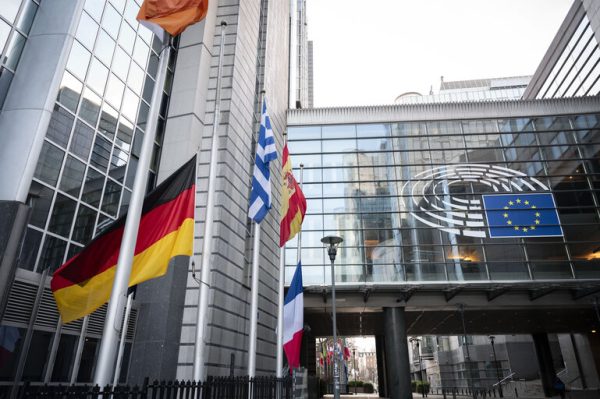
The government seems to be considering reducing the cash limit to 200 euros, from 500 euros today.
According to information, the government’s goal is to further strengthen e-transactions, which have been on the rise in recent years.
It is worth noting that in 2019, electronic transactions reached 40.6 billion euros, 44.7 billion euros in 2020, and 53 billion euros in 2021, while calculations for 2022 speak of an amount that reaches 66 billion euros
The Ministry of Finance reasonably estimates that the increase in electronic transactions will to a certain extent deal with tax evasion, which is a chronic plague for the Greek economy. Within the Finance Ministry’s corridors there is the thought of obliging businesses to spend a greater part of their daily turnover through POS or other electronic transactions programs.
Plan
In particular, the reduction of the limit up to which the use of cash is allowed to carry out a financial transaction concerning the purchase of products or the provision of services is being considered.
This limit is expected to be reduced from 500 to 200 euros for each transaction. Thus, amounts above the new limit of 200 euros related to the sale of goods or the provision of services to individuals should be paid exclusively electronically. Essentially, the use of payment means by card (or any other electronic means), bank transfer, payment through a payment account, but also the use of e-Wallet is expected to qualify.
The next move
The success of the new application “appodixi”, in which taxpayers scan and send problematic receipts to the tax administration, as well as the increase in electronic transactions, leads the Ministry of Finance to take further measures. The government plans to extend the mandatory acceptance of debit or credit card payments, through POS machines, to all business activities.
At the same time, within the next few months, it is expected that the plan for the new type of cash registers and POS that will transfer real-time information on the receipts issued by shops and businesses will finally move forward.
According to the design of Independent Authority for Public REvenue-AADE, cash registers and POS essentially become an instrument for the complete recording of all data in real time and there is the possibility of direct cross-checking by the control mechanisms.
Cash registers and POS will not work autonomously for debit transactions, i.e. for card payments, the payment amount will not be allowed to be typed into the POS. The amount will come out of the cash register.
It should be noted that with two decisions signed by the governor of AADE Giorgos Pitsilis at the end of 2022, technical specifications for two new types of Tax Electronic Mechanism are defined, while at the same time the interface specifications between cash registers and POS are improved.
Target
The tax authorities will have insight into the amount and time of issuance of retail sales receipts and the method of payment by the customer. Cases of income concealment and VAT theft by those who do not issue receipts will be detected.
From the checks so far it has been found that many businesses in their transactions with customers, although they use credit or debit cards, do not issue the retail receipt.
Latest News

Stirring 86th Greek Independence Day Parade Down 5th Ave. Evangelos Marinakis an Honorary Grand Marshal
According to NYPD sources, the 2025 parade is expected to be one of the biggest in recent memory, with some 120 groups with 52 floats and 15 marching bands paraded from 64th to 79th streets along renowned Fifth Avenue

PM Mitsotakis Highlights Chevron’s Interest in Greek EEZ in Weekly Review
“The interest from Chevron is important because a leading American multinational chooses to invest in Greek maritime plots, thus practically recognizing Greece's EEZ in the area,” the prime minister said.

PM Mitsotakis Visits Israel for Talks on Defense, Energy, and Stability
According to sources, the meetings will cover bilateral collaboration as well as regional developments, particularly in the Eastern Mediterranean and Syria.

Pyatt stresses major Greek role in regional energy map, importance of ongoing Greek-Turkish talks
The former US Assistant Secretary of State foe Energy Resources passionately underlines importance of NATO and America's Global Alliances for US security

Applications for Child Benefit Open Again
The electronic platform for submitting Child Benefit applications, A21, will re-open at 08:00 on Monday, March 31, 2025.

Ellinikon Redevelopment Advances: Key Projects on Track
Spanning 17,000 square meters, the shopping center has already leased out 75% of its space, with an average rental price of 85 euros per square meter.

Aid Arrives as Myanmar Struggles with Earthquake Aftermath
Aid is starting to arrive after the powerful 7.7-magnitude earthquake which struck central Myanmar on Friday, causing widespread devastation and claiming over 1,000 lives.

Over 60% Greeks Own a First Home, 39% a 2nd Home: European Report
The responses from 20,000 European adults who participated in the “RE/MAX European Housing Trend Report 2024,” conducted by Opinium Research for RE/MAX Europe, highlight the evolving expectations for residential spaces

Europe’s Economic Outlook Brightens, But Caution Remains, Says Citigroup
Citi forecasts a slight increase in growth from 0.8% in 2024 to 1% this year, with further acceleration slightly above potential in 2026-27.

Greece Fast-Tracks Chevron’s Offshore Entry, Eyes Third Player
Chevron has formally expressed interest in the offshore area "South of the Peloponnese" and, as of March 26, also for blocks "South of Crete I" and "South of Crete II."







![Τουρκία: Μεγάλες βλέψεις για παραγωγή ηλεκτρικών οχημάτων [γράφημα]](https://www.ot.gr/wp-content/uploads/2025/03/ot_turkish_autos-90x90.png)



![BYD: Ποιος είναι ο Γουάνγκ Τσουανφού που χτίζει τα όνειρα της Κίνας [γράφημα]](https://www.ot.gr/wp-content/uploads/2025/03/ot_BYD_Ceo_CHUANFU-90x90.png)


![Ξενοδοχεία: «Τσίμπησαν» οι τιμές το 2024 – Πόσο κόστισε η διανυκτέρευση [πίνακας]](https://www.ot.gr/wp-content/uploads/2025/03/hotels-90x90.jpg)






![ΕΛΣΤΑΤ: Αυξήθηκε η οικοδομική δραστηριότητα κατά 15,6% το Δεκέμβριο [πίνακες]](https://www.ot.gr/wp-content/uploads/2025/03/DSC9655-2-1024x569-1-90x90.jpg)












![Τουρκία: Μεγάλες βλέψεις για παραγωγή ηλεκτρικών οχημάτων [γράφημα]](https://www.ot.gr/wp-content/uploads/2025/03/ot_turkish_autos-600x352.png)







 Αριθμός Πιστοποίησης
Αριθμός Πιστοποίησης